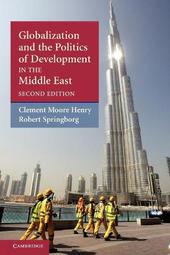
|
Globalization and the Politics of Development in the Middle East
Paperback / softback
Main Details
| Title |
Globalization and the Politics of Development in the Middle East
|
| Authors and Contributors |
By (author) Clement Moore Henry
|
|
By (author) Robert Springborg
|
| Series | The Contemporary Middle East |
|---|
| Physical Properties |
| Format:Paperback / softback | | Pages:382 | | Dimensions(mm): Height 228,Width 163 |
|
| Category/Genre | Economics
Development economics |
|---|
| ISBN/Barcode |
9780521737449
|
| Classifications | Dewey:338.956 |
|---|
| Audience | | Professional & Vocational | |
|---|
| Edition |
2nd Revised edition
|
| Illustrations |
15 Tables, unspecified; 1 Maps; 24 Line drawings, unspecified
|
|
Publishing Details |
| Publisher |
Cambridge University Press
|
| Imprint |
Cambridge University Press
|
| Publication Date |
6 September 2010 |
| Publication Country |
United Kingdom
|
Description
In this 2010 edition of their book on the economic development of the Middle East and North Africa, Clement Henry and Robert Springborg reflect on what has happened to the region's economy since 2001. How have the various countries in the Middle East responded to the challenges of globalization and to the rise of political Islam, and what changes, for better or for worse, have occurred? Utilizing the country categories they applied in the previous book and further elaborating the significance of the structural power of capital and Islamic finance, they demonstrate how over the past decade the monarchies (as exemplified by Jordan, Morocco and those of the Gulf Cooperation Council) and the conditional democracies (Israel, Turkey and Lebanon) continue to do better than the military dictatorships or 'bullies' (Egypt, Tunisia and now Iran) and 'the bunker states' (Algeria, Iraq, Libya, Sudan, Syria and Yemen).
Author Biography
Clement Moore Henry is Professor of Government at the University of Texas, Austin. His publications include The Politics of Islamic Finance (2004) and The Mediterranean Debt Crescent: A Comparative Study of Money and Power in Algeria, Egypt, Morocco, Tunisia, and Turkey (1996). Robert Springborg is Professor of National Security Affairs at the Naval Postgraduate School. Until August, 2008 he held the MBI Al Jaber Chair in Middle East Studies at the School of Oriental and African Studies in London, where he also served as Director of the London Middle East Institute. Professor Springborg's publications include Legislative Politics in the Arab World (1999), Mubarak's Egypt: Fragmentation of the Political Order (1989) and Family Power and Politics in Egypt (1982).
Reviews'... the book provides readers with a deep analysis of economic decision-making processes in a number of country cases, and it is particularly successful in highlighting the reasons behind the economic success of democratic countries vis-a-vis authoritarian regimes. The framework the authors establish throughout the study is useful for comprehending the political economy of development in the MENA region.' Yusuke Kawamura, New Middle Eastern Studies
|